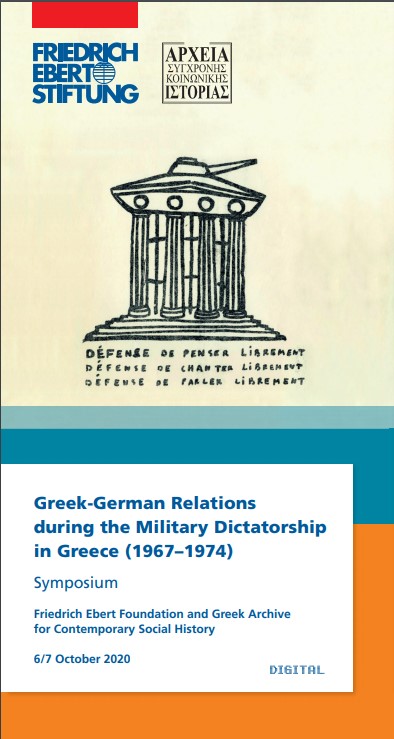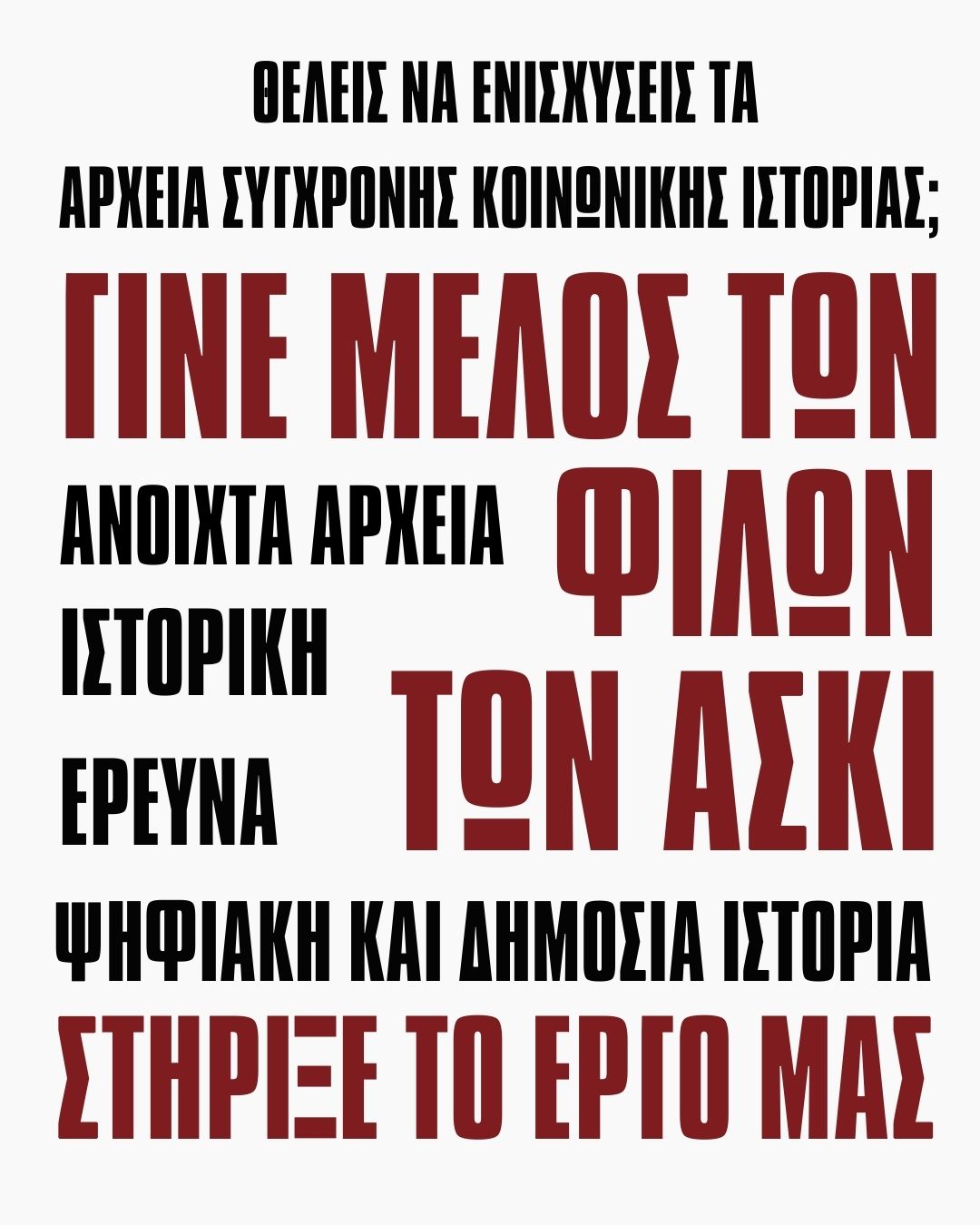 In times of increasing right-wing national tendencies in Europe, it is essential to undertake a scientific and historical appreciation of True-life European solidarity. Especially the testimonies of active solidarity between Germany and the Greek Resistance during the Colonel's Dictatorship in Greece offer excellent starting points for research.
In times of increasing right-wing national tendencies in Europe, it is essential to undertake a scientific and historical appreciation of True-life European solidarity. Especially the testimonies of active solidarity between Germany and the Greek Resistance during the Colonel's Dictatorship in Greece offer excellent starting points for research.
But Greek-German memory as basis of a common memory policy has not yet been sufficiently researched. In particular, the era of the Colonel Regime in 1967–1974 was anchored in neither European nor Greek-German memory culture.
The scope of the conference is to highlight the interconnected histories of the Military Dictatorship in Greece and the rise of European solidarity to the Greek resistance. This underlines the legacies of European solidarity, the creation of transnational spaces of resistance and ideological networks that challenged the balance of power within Greece.
This is a Virtual Scientific conference in cooperation between the Archive for Social Democracy of the Friedrich-Ebert-Foundation (AdsD) and the Greek Archive for Contemporary Social History (ASKI) inviting scientists from Germany, Greece and other Countries.
Tuesday, 06.10.2020
DE: 09.30, GR: 10.30
Opening: Anja Kruke, Head of AdsD
Opening Lecture: Vangelis Karamanolakis, Vice-President of the Board of Directors of ASKI, Athens
DE: 10.30, GR: 11.30 DE: 10.30, GR: 11.30
Panel 1: The Role of German Political Parties and Organizations towards the Military Regime in Greece
The Resistance against the Greek Military Dictatorship in Germany and the Role of the Police and Intelligence Services, Spiridon Papaioanou, Researcher at the University of Regensburg
The Federal Government vs. the Colonels 1967-1974: A Controversial Relationship, Dimitrios K. Apostolopoulos, Senior Researcher at Modern Greek History Research Centre of the Academy of Athens
Moderation: Ursula Bitzegeio, AdsD
DE: 11.30, GR: 12.30 Coffee Break
DE: 11.45, GR: 12.45 DE: 11.45, GR: 12.45
Panel 2: The Networks of Solidarity between Germany and Greece
Architectural Solidarity Networks: The Support of the Akademie der Künste (West) to its Member, Architect Ioannis Despotopoulos, during the Greek Military Dictatorship, Loukas Bartatilas, Researcher at Bauhaus University Weimar
Solidarity through Socio-Political Analysis: The Journal “Das Argument” on Modern Greece and the Military Dictatorship, George Iliopoulos, Appointed Lecturer at National and Kapodistrian University of Athens
Moderation: Manos Avgeridis, Post–Doc researcher, National and Kapodistrian University of Athens
DE: 12.45 GR: 13.45 Lunch Break
DE: 13.45, GR: 14.45
DE: 13.45 GR: 14.45 Panel 3: The Role of Greek Communities in Germany (i.e. Immigrants, Students, Self-Exiled)
Greek Diaspora against Colonels: From First Surprise to Anti-Dictatorship Movement, Chrysa Vachtsevanou, Researcher at the University of Bonn and Editor of the Greek Department at Deutsche Welle, Bonn
The Greek Students' Resistance against the Junta in Western Europe: The Case of European Student Conferences (1967-1971),Antonis Sarantidis, Historian at National and Kapodistrian University of Athens
Moderation: Philipp Kufferath, AdsD
DE: 14.45, GR: 15.45
DE: 14.45, GR: 15.45 Panel 4: Anti-Dictatorship Organizations in Greece and in Western Europe
Challenging Sovereignty. West German Activism against the Greek "Colonel’s Regime”, Frank Bösch, Professor for European History at the University of Potsdam and Director of the Leibniz–Centre for Contemporary History in Potsdam
A European Map of Anti-Dictatorship Press Publications and Organisations with a Special Focus on Germany, Ioanna Vogli, Historian, ASKI, Athens
Moderation: Chris Triantafyllou, Historian at National & Kapodistrian University of Athens
Wednesday, 07.10.2020
DE: 09.00, GR: 10.00 DE: 9.00, GR:10.00
Summary, Joachim Schluetter
DE: 9.15, GR: 10.15
DE: 09.15, GR: 10.15 Panel 5: Comparative Aspects of Military Dictatorships in Southern Europe
The role of the Federal Republic of Germany in the "Europeanization“ and Democratization of Portugal and Spain, António Muñoz Sánchez, Lecturer, Institute of Social Sciences of Lisbon University
“Solidarity and Realpolitik?” Chancellor Willy Brandt, the Colonels in Greece and the dictatorships of the South, Nikos Papanastasiou, Lecturer at National and Kapodistrian University of Athens
Moderation: Charalampos Karpouchtsis, Researcher at Friedrich-Schiller-University, Jena
DE: 10.15, GR: 11.15 Coffee Break
DE: 10.30, GR: 11.30
DE: 10.30, GR: 11.30 Panel 6: State Level Relationships and Culture of Remembrance between the Federal Republic of Germany and Greece
Art as a Common Field for Memory? Controversies on documenta 14, Carolina Rehrmann, Executive Manager, Jena Centre for Reconciliation Studies (JCRS) and Post-Doc Researcher at the University of Jena
Alekos Panagoulis: The Formation of an Anti-Dictatorial Hero [1968-1981], Dimitris Garris, Historian at the National and Kapodistrian University of Athens
German Printed Media about the Greek Junta, Hans-Peter Schunk, Historian, University of Marburg
Moderation: Stathis Pavlopoulos, Project Coordinator at ASKI, Athens
DE: 11.30, GR: 12.30
Final Discussion



